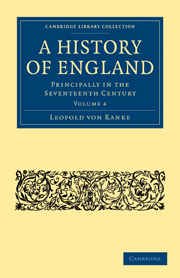Book contents
- Frontmatter
- Contents
- BOOK XVI THE LATER YEARS OF CHARLES II, 1675—1685 WHIGS AND TORIES
- BOOK XVII REIGN OF JAMES II, FEBRUARY 1685 TO SEPTEMBER 1688
- INTRODUCTION
- CHAP. I Accession of James II. First sittings of a new Parliament
- CHAP. II Repulse of the Refugees
- CHAP. III Later sittings of the Parliament
- CHAP. IV Declaration of the Right of Dispensation The Ecclesiastical Commission
- CHAP. V The King and William Penn. Declaration of Indulgence
- CHAP. VI Preparations for securing a Nonconformist Parliament
- CHAP. VII Trial of the Bishops. Further projects
- BOOK XVIII THE FALL OF JAMES II IN ITS CONNEXION WITH THE EUROPEAN CONFLICTS WHICH MARKED THE CLOSE OF 1688
- BOOK XIX COMPLETION OF THE REVOLUTION IN THE THREE KINGDOMS, 1688—1691
CHAP. IV - Declaration of the Right of Dispensation The Ecclesiastical Commission
Published online by Cambridge University Press: 07 September 2011
- Frontmatter
- Contents
- BOOK XVI THE LATER YEARS OF CHARLES II, 1675—1685 WHIGS AND TORIES
- BOOK XVII REIGN OF JAMES II, FEBRUARY 1685 TO SEPTEMBER 1688
- INTRODUCTION
- CHAP. I Accession of James II. First sittings of a new Parliament
- CHAP. II Repulse of the Refugees
- CHAP. III Later sittings of the Parliament
- CHAP. IV Declaration of the Right of Dispensation The Ecclesiastical Commission
- CHAP. V The King and William Penn. Declaration of Indulgence
- CHAP. VI Preparations for securing a Nonconformist Parliament
- CHAP. VII Trial of the Bishops. Further projects
- BOOK XVIII THE FALL OF JAMES II IN ITS CONNEXION WITH THE EUROPEAN CONFLICTS WHICH MARKED THE CLOSE OF 1688
- BOOK XIX COMPLETION OF THE REVOLUTION IN THE THREE KINGDOMS, 1688—1691
Summary
Louis XIV did not fail to express to the King of England approval of the attitude assumed by him, and represented that his authority must gain strength if he did not suffer the religion which he professed to be subject to the oppression of the old laws. James II answered by a declaration that he held fast to his purposes in relation to the Catholic religion, and hoped to carry them out by a close alliance with France. Both princes were agreed that the Parliament had better not be reassembled at once; the King of France because he continued to fear that it might make approaches to Spain, the King of England because he could not at first expect any result corresponding to his views. When, as early as January 1686, he again prorogued Parliament to the following May, he allowed it to be understood that he did not pledge himself thereby to convoke it at the latter date: ‘he wished to show the members that he could carry on the public administration without their grants; when they saw that, they would be less refractory.’ Lord Rochester too held it possible to call out a more accommodating disposition; perhaps by presents—for Louis XIV, on his side, placed some resources at the disposal of his envoy for this purpose—and by moderating the Catholic zeal of the government. James II did not promise himself much from bribes; he was not at all disposed to spend his money in buying uncertain services.
- Type
- Chapter
- Information
- A History of EnglandPrincipally in the Seventeenth Century, pp. 281 - 302Publisher: Cambridge University PressPrint publication year: 2010First published in: 1875



